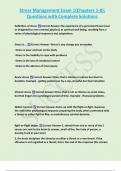Stress Management Exam 1(Chapters 1-8);
Questions with Complete Solutions
Definition of stress Correct Answer-The experience of a perceived threat (real
or imagined) to one's mental, physical, or spiritual well being, resulting from a
series of physiological responses and adaptations.
Stress is... Correct Answer--Stress is any change you encounter
-Stress is wear and tear on the body
-Stress is the inability to cope with problems
-Stress is the loss of emotional control
-Stress is the absence of inner peace
Acute stress Correct Answer-Stress that is intense in nature but short in
duration. Example - getting pulled over by a cop, stressful but short situation
Chronic stress Correct Answer-Stress that is not as intense as acute stress,
but that lingers for a prolonged period of time. Example - financial problems
Walter Cannon Correct Answer-Came up with the flight-or-fight response;
the instinctive physiological response preparing the body, when confronted with
a threat to either fight or flee; an evolutionary survival dynamic.
fight-or-flight stages Correct Answer-1. stimuli from one or more of the 5
senses are sent to the brain (a scream, smell of fire, the taste of poison, a
passing truck in your lane)
2. the brain deciphers the stimulus as either a threat or a non threat. If the
stimulus is not regarded as a threat, this is the end of the response (the scream
, Stress Management Exam 1(Chapters 1-8);
Questions with Complete Solutions
came from the t.v.) However, if the response is decoded as a real threat, the
brain activates the nervous and endocrine systems to quickly prepare for
defense and/or escape.
3. The body stays activated, aroused, or keyed up until the threat is over
4. The body returns to homeostasis, a state of physiological calmness, once the
state is gone.
Stage 1 of fight-or-flight Correct Answer-1. stimuli from one or more of the 5
senses are sent to the brain (a scream, smell of fire, the taste of poison, a
passing truck in your lane)
Stage 2 of fight-or-flight Correct Answer-2. the brain deciphers the stimulus
as either a threat or a non threat. If the stimulus is not regarded as a threat, this
is the end of the response (the scream came from the t.v.) However, if the
response is decoded as a real threat, the brain activates the nervous and
endocrine systems to quickly prepare for defense and/or escape.
Stage 3 of fight-or-flight Correct Answer-3. The body stays activated, aroused,
or keyed up until the threat is over
Stage 4 of fight-or-flight Correct Answer-4. The body returns to homeostasis,
a state of physiological calmness, once the state is gone.
Hans Selye Correct Answer-Came up with the General Adaptation Syndrome,
there are three distinct physiological phases in reaction to chronic stress; 1. the
alarm phase 2. the resistance phase 3. the exhaustion phase
, Stress Management Exam 1(Chapters 1-8);
Questions with Complete Solutions
General Adaptation Syndrome Correct Answer-1. Alarm phase - Several body
systems are activated, primarily the nervous system and endocrine system,
followed by the cardiovascular, pulmonary, and musculoskeletal systems. All
senses are put on high alert until the danger is over.
2. Resistance phase - The body tries to revert to a state of physiological
calmness, or homeostasis, by resisting the alarm. Because the perception of a
threat still exists; however, complete homeostasis is never reached. Instead, the
body stays activated or aroused, usually at a lesser intensity that during the
alarm stage but enough to cause higher metabolic rate in some organ tissue.
3. Exhaustion phase - exhaustion occurs when one or more of the organs are
targeted by specific metabolic processes can no longer meet the demands
placed upon it and fails to function properly. This can result in death to the
organ and depending on which organ becomes dysfunctional (the heart),
possibly the death of the organism as a whole.
General Adaptation Syndrome phase 1 Correct Answer-1. Alarm phase -
Several body systems are activated, primarily the nervous system and endocrine
system, followed by the cardiovascular, pulmonary, and musculoskeletal
systems. All senses are put on high alert until the danger is over.
General Adaptation Syndrome phase 2 Correct Answer-2. Resistance phase -
The body tries to revert to a state of physiological calmness, or homeostasis, by
resisting the alarm. Because the perception of a threat still exists; however,
complete homeostasis is never reached. Instead, the body stays activated or
, Stress Management Exam 1(Chapters 1-8);
Questions with Complete Solutions
aroused, usually at a lesser intensity that during the alarm stage but enough to
cause higher metabolic rate in some organ tissue.
General Adaptation Syndrome phase 3 Correct Answer-3. Exhaustion phase -
exhaustion occurs when one or more of the organs are targeted by specific
metabolic processes can no longer meet the demands placed upon it and fails to
function properly. This can result in death to the organ and depending on which
organ becomes dysfunctional (the heart), possibly the death of the organism as
a whole.
Stress and Sleep Correct Answer-Strong connection between stress and
insomnia
Insomnia Correct Answer-poor quality sleep, abnormal wakefulness or the
inability to sleep - can affect anyone
Emotional stress (preoccupation with daily stressors) - primary cause of
insomnia
Anxious state of mind, racing thoughts, tense muscles, does not allow for restful
sleep.
60% of Americans suffer from poor sleep quality according to National
Foundation for sleep.




